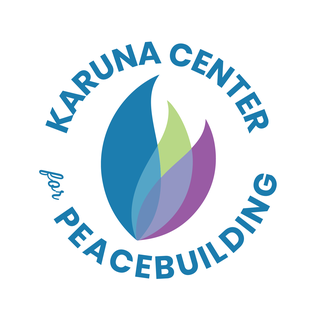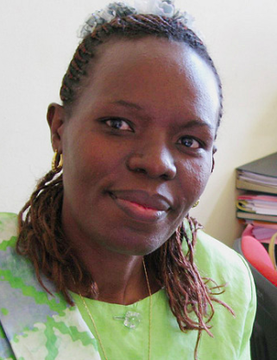The Rwandese National Union was a conservative, pro-monarchy political party in Rwanda.
The United Network of Young Peacebuilders (UNOY Peacebuilders) is a global network of young people and youth organisations active in the field of peacebuilding and conflict transformation. UNOY Peacebuilders was founded in 1989 and is working with youth mostly in violent conflict and post war regions. The core activities of UNOY Peacebuilders are capacity building as well as advocacy and campaigning.
The Gruber Prize for Women's Rights, established in 2003, was one of five international prizes worth US$500,000 awarded by The Peter and Patricia Gruber Foundation, an American non-profit organization.
Pro-Femmes Twese Hamwe is a national women's organization in Rwanda founded in 1992 that is recognized internationally for its contributions to rebuilding society after the 1994 genocide against the Tutsi in Rwanda. These women took on the role of reconstructing what had been damaged. In order to restore Rwanda the women created projects to improve the economy, establish peace, and offer new opportunities. The 13 women that started this organization were determined to speak out for injustices, especially against women, so they became a voice for change. The genocide incident caused great destruction; however, since 1994 the organization has grown to include 58 member associations. These women work hard to make the changes and help the minorities grow and develop.

Karuna Center for Peacebuilding (KCP) is a 501(c)(3) non-profit organization based in Amherst, Massachusetts. The stated mission of KCP is to empower people divided by conflict to develop mutual understanding and to create sustainable peace. The organization was named for the Sanskrit word for compassion. The organization's efforts in facilitating "post-conflict reconciliation" have led to active programs in more than 30 countries. KCP has co-implemented programs with the United States Agency for International Development, United States Department of State, United States Institute of Peace, and Fund for Peace, among others.

Godeliève Mukasarasi is a Rwandan social worker, genocide survivor, and rural development activist. She created the organization Sevota to support widowed women and their children after the genocide. In 2018 she was given an International Women of Courage award for her work.
As of 2018, the African country Rwanda ranks in the top five countries for gender equality according to the Global Gender Gap Report. The idea of fairness that dominates this country arose after the genocide against the Tutsi that occurred in 1994. The government is committed to ensuring equal rights for women and men without prejudice to the principles of gender equality and complementarity in national development. These ideas are exhibited through the roles of Rwanda women in government, the respect for women's education and the role of women in Rwanda healthcare. The country also took an active stance against rape in genocide, created a national action plan after United Nations Resolution 1325, and is pushing towards ending gender-based violence.

In 2001, as part of International Alert's Women Building Peace campaign, the United Nations Development Fund for Women awarded a Millennium Peace Prize for Women. The bronze prize was commissioned from American figurative sculptor Tim Holmes, who has created several such international awards. The sculpture, entitled Anima Mundi, depicts a woman whose facial features combine elements of many races, reaching and striding forward, hand on heart.

Judith Kanakuze was a Rwandan politician and women's rights activist best known for passing legislation against gender-based violence, including Rwanda's first legal definition of rape, and contributing constitutional gender quotas that required women's representation in governmental bodies. She worked in multiple fields, including nutrition and civil service, before becoming a prominent leader of women after the 1994 Rwandan genocide, in which she lost most of her extended family. Kanakuze founded the early women's organization Réseau des Femmes and represented women's interests at the Arusha Accords and on Rwanda's committee to establish a constitution. The gender quotas that required women to compose at least 30 percent of governmental bodies subsequently quickly spurred women's participation to exceed the quotas in parliament. She was elected to Parliament in 2003 and reelected in 2008. During her terms, she presided over the Rwanda Women Parliamentary Forum.
The Rwanda Women Parliamentary Forum is a cross-party women's caucus aimed at uniting women in the Rwandan parliament towards common goals, and championing gender equality interests at the legislative level. Founded in 1996, the FFRP's specific objectives include building solidarity among female members of parliament (MPs) regardless of differing party ideologies, supporting women in parliament to get involved in the revision or repeal of laws that discriminate against women, and to raise awareness among other MPs, as well as public and private institutions, about the importance of gender equality. Their motto is "solidarity, women's empowerment and equality".

Princess Sarah Zeid is a Jordanian-American humanitarian and maternal and newborn health activist. Through her marriage to Prince Zeid bin Ra'ad al-Hussein, she is a Jordanian princess and a member of the House of Hashem. Her husband is the apparent heir to the pretender to the abolished throne of Iraq.
In 1999, Rwanda began its National Unity and Reconciliation Commission (NURC) in order to work towards a reconciliation of the conflicting parties involved in the Rwandan Civil War and the Rwandan genocide, with the eventual goal of reunifying the country’s citizens. The passage of the Government of National Unity Law No. 03/99 provided for the establishment of the National Unity and Reconciliation Commission, which became a permanent body in 2002, and continues its function to the present day. As its name suggests, the Commission is intended to promote unity and reconciliation amongst the former opponents present in the Rwandan population.
Thelma Arimiebi Ekiyor is a Nigerian lawyer, social entrepreneur and impact investor who has served in authoritative positions within many organizations. Ekiyor has focused primarily on investing in women entrepreneurs. She started her career supporting women in peacebuilding and empowering women and youth through financial independence and educational access. She has experience with projects in more than 22 African countries. Ekiyor worked in post-conflict countries such as Liberia with the peace activist Leymah Gbowee.
Christine Muhongayire is a Rwandan politician, currently a member of the Chamber of Deputies in the Parliament of Rwanda.
Susan Michelle Thomson is a Canadian human rights lawyer and professor of peace and conflict studies at Colgate University. She worked in Rwanda for years in various capacities and is known for her books focusing on the post-genocide history of the country, which have received good reviews. Although she initially supported the ruling Rwandan Patriotic Front (RPF), Thomson later reevaluated her position.
Rehmah Kasule is a Ugandan social entrepreneur, public speaker and author. She is the founder of CEDA International a non-profit organization in Uganda.
Jeannette Bayisenge is Rwandan socialist politician and the current Minister of Public Service and Labour in Rwanda. She was appointed to the role by President Paul Kagame on 22 August 2023. She has also served as Minister of Gender and Family Promotion in Rwanda (MIGEPROF) since 2020 and as Associate Professor of gender studies at the University of Rwanda.
Whispering Truth to Power: Everyday Resistance to Reconciliation in Postgenocide Rwanda is a 2013 non-fiction book by Susan Thomson, published by University of Wisconsin Press.
Fatuma Ndangiza is a women's rights advocate, policy expert, and politician. As of January 2024, she is serving her second term as a Rwandan member of the East African Legislative Assembly. Born and raised in a refugee camp in Uganda, she returned to Rwanda during the civil war. Initially she settled in Byumba and led the SOS Ramira initiative to assist women and children in acquiring basic supplies and treatment to meet their needs. When the Rwandan Patriotic Front took control of Kigali, she moved to the capital and began working in the Ministry for Women and Family Promotion to provide support and relief to survivors and victims of the Rwandan genocide. She helped to create the National Women's Council and its regional and local frameworks to empower women to help them achieve political and economic parity through legal change and advocacy. She worked with the women's ministry until 2002.
Anne Nkirote Kubai is an associate professor of World Christianity and interreligious studies. She is a researcher at the School of Historical and Contemporary Studies, Södertörn University, Sweden. She researches on conflict and peace building, religion, genocide, transitional justice, sexual and gender-based violence and psychosocial studies. She is a professor extraordinarius at the Institute of Gender Studies at the University of South Africa (UNISA).





